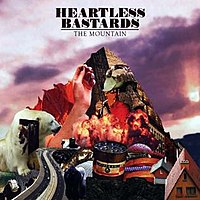What I'm Reading
4/22/09
4/18/09
Rock Band Seeks to Move Mountains (Heard)
 Garage rock band? Country rock? If they ever were, they're not anymore. The Heartless Bastards, led by guitarist/singer Erika Wennerstrom, recently underwent a huge lineup change and relocated from Ohio to Texas. The result is a heavy record.
Garage rock band? Country rock? If they ever were, they're not anymore. The Heartless Bastards, led by guitarist/singer Erika Wennerstrom, recently underwent a huge lineup change and relocated from Ohio to Texas. The result is a heavy record.Did I say it was heavy yet?
The Mountain has a couple bright moments, mostly due to Wennerstrom's voice and her big chunks of guitar. The little touches, like slide guitar on the title track and fiddle on Had to Go, help. But mostly the album sludges along. All in all, it's not a very consistent album. But if you love Led Zeppelin or the big stoner rock of Black Mountain, you'll like this Mountain, too.
Labels:
Distractions,
Heard,
Heartless Bastards,
indie rock,
The Mountain
4/16/09
Vinyl Records!
Saturday is Independent Record Store Day, and I'm psyched. To get you in the mood, here's Todd Snider singing Vinyl Records.
4/15/09
From the Forest to the Sea (Heard)
 It's great to see the Ohio band Southeast Engine getting some critical attention. I stumbled upon (and blogged about) their 2007 album Wheel Within a Wheel last year. Their latest From the Forest to the Sea is a logical successor. Like Wheel, it runs through all styles of rock-- country, garage and Southern -- with lyrics full of Biblical references. From the Forest is a concept album about a man who said he "wouldn't do no evil, but evil is exactly what he's done."
It's great to see the Ohio band Southeast Engine getting some critical attention. I stumbled upon (and blogged about) their 2007 album Wheel Within a Wheel last year. Their latest From the Forest to the Sea is a logical successor. Like Wheel, it runs through all styles of rock-- country, garage and Southern -- with lyrics full of Biblical references. From the Forest is a concept album about a man who said he "wouldn't do no evil, but evil is exactly what he's done."Popmatters has called it the first "truly outstanding record of 2009."
Good stuff, particularly for those who like Okkervil River. Give a listen to Black Gold from Forest and Quit While You're Ahead from Wheel over on the Currently Spinning playlist.
4/13/09
We'll Miss You Harry
It wasn't until I heard about Harry Kalas' passing this afternoon that I fully realized how much he was a part of my life. I didn't know him personally and I certainly wasn't part of a fan club. If anything, I think I took Harry the K and his silky baritone for granted.
When I lived in Philadelphia, he was always there. One of my fondest memories with my dad is when we used to listen to Phillies' games at night in the kitchen. As a kid, I'd memorized all the batting stances of the Fightins' lineup, but, in my head, I'd hear their introductions in Kalas' voice. ("And now up, Michael Jack Schmidt). As a teenager, I'd drive around the streets of Northeast Philly in my yellow Mustang with the window down and the baseball game on the radio.
Harry was the soundtrack to summer.
Well Miss You Harry
When I lived in Philadelphia, he was always there. One of my fondest memories with my dad is when we used to listen to Phillies' games at night in the kitchen. As a kid, I'd memorized all the batting stances of the Fightins' lineup, but, in my head, I'd hear their introductions in Kalas' voice. ("And now up, Michael Jack Schmidt). As a teenager, I'd drive around the streets of Northeast Philly in my yellow Mustang with the window down and the baseball game on the radio.
Harry was the soundtrack to summer.
Well Miss You Harry
Labels:
Distractions,
Harry Kalas,
marah,
Michael Jack Schmidt,
Phillies,
Rain Delay
Giving up on The Women (Read)
 I'm a huge fan of TC Boyle. Two of his books -- The Inner Circle and Tortilla Curtain -- are among my five favorites. And I've liked just about everything he's written. Until his latest, The Women. I don't think it's a bad book. Boyle's writing is solid, as usual and it certainly has some of Boyle's screwball moments. The Women is a fictional re-telling of Frank Lloyd Wright's love life through the eyes of the four women he loved, lost, left, etc. The book's narrator is a fictional Japanese architect student who serves as Wright's apprentice for several years, and the book is littered with footnotes, giving it a "historical feel." Wright, in real life, was certainly a character, one worthy of the Boyle treatment. But I found little compelling about the female characters and eventually the put the book down halfway through.
I'm a huge fan of TC Boyle. Two of his books -- The Inner Circle and Tortilla Curtain -- are among my five favorites. And I've liked just about everything he's written. Until his latest, The Women. I don't think it's a bad book. Boyle's writing is solid, as usual and it certainly has some of Boyle's screwball moments. The Women is a fictional re-telling of Frank Lloyd Wright's love life through the eyes of the four women he loved, lost, left, etc. The book's narrator is a fictional Japanese architect student who serves as Wright's apprentice for several years, and the book is littered with footnotes, giving it a "historical feel." Wright, in real life, was certainly a character, one worthy of the Boyle treatment. But I found little compelling about the female characters and eventually the put the book down halfway through.That all said, TC Boyle is a wonderful talent. Barbara Kingsolver once wrote that what "Boyle does, and does well, is lay on the line our national cult of hypocrisy." My nonexpert opinion is that he's one of the most gifted writers of the last few decades. So if you heed my blog post and avoid The Women, please take the time to pick up one of his numerous other books -- all of which I highly recommend.
Labels:
Distractions,
T.C. Boyle,
The Inner Circle,
The Women,
Tortilla Curtain
4/12/09
Science in the Time of Cholera (Read)

A couple weeks ago, my favorite radio show This American Life had as its theme -- The Wrong Side of History.
And that's where Edwin Chadwick finds himself in Steven Johnson's The Ghost Map, a fascinating nonfiction account of London's 1854 cholera outbreak. Chadwick was a miasmist. He believed that cholera and other diseases were transmitted through the air. The public health official saw the cesspools, street refuse and waste in Londoner's basements as a health hazard. So he developed -- and delivered on -- an impressive plan to take all that, quite literally, shit and deposit it in the Thames.
Johnson writes:
"Chadwick was building an elaborate scheme that would deliver the cholera bacteria directly to the mouths of Londoners ... By the end of the outbreak, nearly 15,000 Londoners would be dead. The first defining act of a modern centralized public-health authority was to poison an entire urban population."
Oops.
Johnson goes on to compare "Chadwick's folly" to the decision during the 1665-66 plague to mass exterminate all the dogs and cats who some felt were spreading the disease. But the real source of the problem was rats. And they "grew exponentially after the sudden, state-sponsored demise of their only predators."
It's those kinds of details that make Johnson's books so enjoyable. He tackles scientific history and presents it as an engaging , original way. He's kind of a combination of Erik Larson (Devil in White City) and Mary Roach (Bonk).
The hero of The Ghost Map is John Snow, known for his groundbreaking work in anesthesia. Like Joseph Priestly, the hero of Johnson's new book The Invention of Air, Snow is an amateur scientist (at least when it comes to diseases like cholera), but through determination and intelligence, he figures out the source of the problem.
You can read more about this book at its Web site. And see my review of The Invention of Air.
Labels:
books,
Cholera,
Distractions,
Steven Johnson,
The Ghost Map
4/10/09
Listen to this Wilco Offshoot -- Pronto! (Heard)
 Listening to a Wilco side projectsusually requires a bit of patience. Whether its Nels Cline shredding, or Glenn Kotche going off on the skins, or even the progressive rock of Loose Fur, the players are expanding their field and experimenting. And it's good music. I love both Loose Fur albums. But it takes some patience.
Listening to a Wilco side projectsusually requires a bit of patience. Whether its Nels Cline shredding, or Glenn Kotche going off on the skins, or even the progressive rock of Loose Fur, the players are expanding their field and experimenting. And it's good music. I love both Loose Fur albums. But it takes some patience.So what a treat to hear the fresh blast of 70s pop-rock on Pronto's debut All Is Golden. Pronto includes Wilco keyboardist Mikael Jorgensen and his former Lizard Music bandmate Eric Paparazzi.
Between the lead-off track Listen Lover and the closer I Think So there is little filler. This is one consistent, and accessible album, from the tender folk of Had & Have to the fuzzed-out Monster.
Pronto is at its best channeling The Band in I Don't Know Where All My Good Friends Have Gone and What Do You Know About You? When I'm on the Rocks sounds suspiciously like I Must Be High from Wilco's first album (a song penned long before Jorgensen joined the band).
You can hear the title track and I Don't Know Where All My Good Friends Have Gone on the right-hand side in Currently Playing.
Labels:
Distractions,
Mikael Jorgensen,
music,
Pronto,
Wilco
4/9/09
Man Without an Ending (Read)
 Late last week, I finished reading the Hugo Award-winning Man in the High Castle. It was my introduction to sci-fi legend Philip Dick, and I was immediately pulled into his terrifying alternative history. Following FDR's assassination, the U.S. was weakened and eventually lost World War II. Now the West Coast is Japanese territory and the East Coast belongs to the Germans. Dick makes this scenario feel realistic. It's quite chilling and draws you into the book. But, unfortunately, once the premise is set, the book goes nowhere and the ending is very unsatisfying.
Late last week, I finished reading the Hugo Award-winning Man in the High Castle. It was my introduction to sci-fi legend Philip Dick, and I was immediately pulled into his terrifying alternative history. Following FDR's assassination, the U.S. was weakened and eventually lost World War II. Now the West Coast is Japanese territory and the East Coast belongs to the Germans. Dick makes this scenario feel realistic. It's quite chilling and draws you into the book. But, unfortunately, once the premise is set, the book goes nowhere and the ending is very unsatisfying.
Labels:
Distractions,
Man in the High Castle,
Philip K. Dick
4/8/09
Flaming Lips Cover Madonna (Seen)
Distractions' favorites Flaming Lips join Stardeath and Dwarfs for a spacy yet rocking version of Madonna's Borderline. Click here.
Labels:
Distractions,
Flaming Lips,
Madonna
4/7/09
Rod MacDonald Returns (Heard)

Kudos to Rod MacDonald for another folk classic -- the 16-song set After the War, a stirring collection of both new and old material. The disc, which was produced by JP Bowersock, guitarist for Ryan Adams & the Cardinals, runs the folk gamut.
It includes the classic White Buffalo. But the highlight is actually Stop the War (also originally on White Buffalo), which sounds as relevant now as when Rod originally wrote it in 1982. Rod does a tender remake of the 1962 George Pitney hit Half Heaven, Half Heartache. George Gehring, who wrote the song, plays piano on the track. (Listen to Stop the War in Currently Spinning on the right-hand side of the page).
No, it's not the kind of move that's going to send Rod straight up the pop charts. But this is no oldies disc. Like all Rod's work, it's feels fresh and able to stand the test of time. And hey, Ballerina initially sounds like something out of the Hold Steady catalog before settling into something you could picture Bruce Springsteen or Ryan Adams singing.
4/5/09
LP Cover Lover -- Number Two (Seen)


I've already praised the cultural benefits -- and overall fun -- of the LP Cover Lover Web site. Well, you better sit down for this one. Men, you can stand. But don't miss yesterday's cover of The Bathrooms Are Coming, a 1969 classic "created, performed and released as a 'souvenir' to employees and customers by the American Standard bathroom fixtures company."
Go to Cover Lover and give this baby five stars. Then, head on over to WFMU's Beware of the Blog to hear the album in its beautiful entirety.
Just make sure to shut and lock the door behind you.
Nothing Comical About This Masterpiece (Heard)
 Sunday morning.
Sunday morning.Overcast skies
Sleeping in, then reading the Sunday paper in bed.
I've found Robert Wyatt's 2007 release Comicopera to be the perfect soundtrack for this type of morning. Wyatt's sad, sad voice and his mix of jazz, chamber-pop and avant garde are geared to those slow moments, where you can take time to let the music and words wash over you.
Comicopera is a 16-song set, broken up into three parts. If you're downloading, and short on dough, focus on the first part, starting off with the goosebump-inducing Stay Tuned.
4/3/09
Somebody Call a Priestly! (Read)
 I picked up Steven Johnson's latest book not because of science, or even history, the author's areas of expertise.
I picked up Steven Johnson's latest book not because of science, or even history, the author's areas of expertise.It was religion.
The Invention of Air is Johnson's biography of Joseph Priestly, the founder and first minister of the First Unitarian Church of Philadelphia. (It's aptly named, as the church is the first in the country to call itself "Unitarian.") The 14th minister of the First Unitarian was Rev. Ken Collier, who married me and my wife.
However, science plays a huge role in Johnson's book, which highlights Priestly's amazing string of success -- a productive eight-year period that included his discovery of oxygen and creation of soda water. It's probably just my lack of scientific curiosity, but I struggled through the middle of Invention. It seemed weighed down in science and unnecessary conjecture, as Johnson tries to find a connection between Priestly's amazing run of success and others, such as Joe Dimaggion's 56-game hitting streak.
Luckily, Priestly had a pretty amazing life outside of the home lab, too. He was an educator, writer, philosopher, politician, dissenting clergyman. It was his political and religious activity that led an angry mob to burn down his house and church, causing Priestly and his family to leave England for America.
Johnson gives Priestly a human quality, whether it's doing tricks for kids or conducting experiments at the local brewery.
Priestly was a close friend of Benjamin Franklin and Thomas Jefferson. He was part of a group -- the Lunar Society -- that included not just one, but both of Charles Darwin's grandfathers.
Invention of Air is not really not just about Priestly. It's about an era, when men sat around coffeehouses discussing problems and searching for solutions; where science, philosophy, politics and religion mixed openly. Information was shared freely, which is why Joseph Schweppes ended up making millions off of Priestly's soda water.
Priestly makes for a fascinating topic and a book worth reading, even if it does veer just a little off course at times.
Subscribe to:
Comments (Atom)



